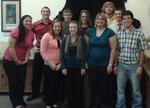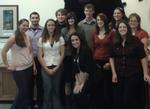News & Events
Westminster College Chemistry Majors Present at Watershed Group Meeting
Posted on Wednesday, October 31, 2012
NEW WILMINGTON, Pa. - Twenty-one Westminster College chemistry and biochemistry majors presented the results of a service-learning project at a meeting of the Slippery Rock Watershed Coalition (SRWC) Oct. 11 at the Jennings Environmental Education Center.
The students are from an advanced laboratory class taught by Dr. Helen Boylan, Westminster associate professor of chemistry. They collaborated with the SRWC to test the passive water treatment system for treating abandoned mine drainage at the DeSale Restoration Area Phase I and Phase II sites in Butler County.
As part of the four-week project, students studied background literature on abandoned mine drainage, went on a field trip to the sites to do field tests of the water and collect water samples, and used standard methods to analyze various water quality parameters in the lab setting. Through this collaboration, the SRWC was able to obtain lab-quality data on its passive treatment sites that the non-profit organization would not otherwise be able to afford.
Students presented results of the field and lab tests at the SRWC meeting. Their findings confirm that both passive treatment sites are working well. Following the presentation, Margaret Dunn, a founding member of SRWC, commended the students, indicating the students did an excellent job explaining the chemistry behind their results.
Westminster's chemistry program is approved by the American Chemical Society and is based on a career-track system. Students may elect one of five tracks, depending on their goals: professional chemist, forensic science, secondary certification, pre-medical/dental or 3-2 chemical engineering.
Taken during the junior-year, the advanced laboratory course features semi-independent laboratory projects that mirror work done by professional chemists in graduate school, industry and government laboratories. The course integrates methods and techniques normally taught as the laboratory experiences of various upper-level courses. This course is taken for two semesters and includes participation in a weekly seminar. Westminster graduates report that this course made them better prepared than many students from other institutions.
"This service-learning project is a great way for the students to see the chemistry that they learn in the classroom being applied in a real world-example," Boylan said.
In addition to the advanced laboratory, majors are required to perform independent research with a faculty member during their senior year. This experience provides extensive individualized training and, like the laboratory course, allows the student to utilize and refine knowledge and skills gained in courses. Students then present their research at a scientific meeting.
Contact Boylan at (724) 946-6293 or email for additional information.


More Stories



